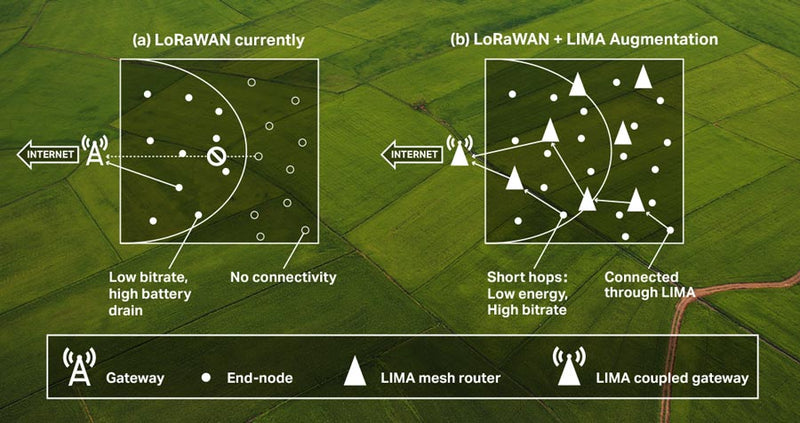Small Business Innovation Research Program Provides Seed Funding for R&D
JERSEY CITY, NJ (April 25, 2022) — goTenna and Wesleyan University have been awarded a National Science Foundation (NSF) Small Business Innovation Research (SBIR) grant for $230,000 to conduct research and development (R&D) work on improving the connectivity, energy-efficiency, and throughput of Long-Range Low-Power Wide Area Networks (LPWAN) using mesh networking. The NSF SBIR is one of the most competitive programs in the U.S. Government in which between one in six and one in ten applicants are selected.
The funding will go towards advancing goTenna’s LPWAN IoT Mesh Augmentation (LIMA) concept put forth by goTenna Chief Scientist Ram Ramanathan and Director of Firmware Engineering, Christophe Servaes. In this concept, a mesh network of LIMA devices will adaptively multi-hop relay end-device messages to optimize effective capacity, energy and range of an LPWAN.
The work from the grant will benefit a range of applications including public safety, smart agriculture, supply chain logistics, smart cities, wildlife monitoring, healthcare and several others, a total addressable market exceeding $16 billion. The coverage and cost benefits are especially impactful for the U.S population that is marginalized (remote and/or poor), those that are in danger of being left behind in the IoT revolution for lack of cost-effective connectivity.
The LIMA device will adapt goTenna’s game-changing Aspen Grove mesh networking protocol which has unparalleled efficiency in low-bit-rate environments. It will also leverage novel routing mechanisms based on Deep Reinforcement Learning developed by Professor Victoria Manfredi and her colleagues at Wesleyan University. LIMA can extend the coverage range of a typical LoRaWAN system by over 10x, and significantly increase its resilience to outages at a fraction of the cost of adding additional gateways.

goTenna’s LIMA technology can provide operators and their sensors with significantly increased coverage, longevity and throughput.
“NSF is proud to support the technology of the future by thinking beyond incremental developments and funding the most creative, impactful ideas across all markets and areas of science and engineering,”
said Andrea Belz, Division Director of the Division of Industrial Innovation and Partnerships at NSF.
“With the support of our research funds, any deep technology startup or small business can guide basic science into meaningful solutions that address tremendous needs.”
“NSF’s SBIR program unleashes high risk, high reward research with real-world applications. We are excited for the opportunity to develop next-generation IoT networks via our LIMA protocol in partnership with Wesleyan University,”
said goTenna CEO Ari Schuler.
Once a small business is awarded a Phase I SBIR/STTR grant (up to $275,000), it becomes eligible to apply for a Phase II (up to $1,000,000). Small businesses with Phase II funding are eligible to receive up to $500,000 in additional matching funds with qualifying third-party investments or sales.
Startups or entrepreneurs who submit a written Project Pitch will know within one month if they meet the program’s objectives to support innovative technologies that show promise of commercial and/or societal impact and involve a level of technical risk. Small businesses with innovative science and technology solutions, and commercial potential are encouraged to apply. All proposals submitted to the NSF SBIR/STTR program, also known as America’s Seed Fund powered by NSF, undergo a rigorous merit-based review process. To learn more about America’s Seed Fund powered by NSF, visit: https://seedfund.nsf.gov/
About goTenna
goTenna was founded in 2012. The company shipped two generations of consumer mesh-networking devices in 2015 and 2017, before releasing its tactical-grade goTenna Pro product line in 2018. The goTenna team is led by seasoned individuals with broad innovation experience at companies like Raytheon BBN, Qualcomm, and Cisco and is backed by venture capital investors such as Founders Fund and Union Square Ventures. In addition, goTenna has received NRE funding from Google and the U.S. Department of Defense.
About the National Science Foundation's Small Business Programs
America’s Seed Fund powered by NSF awards $200 million annually to startups and small businesses, transforming scientific discovery into products and services with commercial and societal impact. Startups working across almost all areas of science and technology can receive up to $2 million to support research and development (R&D), helping de-risk technology for commercial success. America’s Seed Fund is congressionally mandated through the Small Business Innovation Research (SBIR) program. The NSF is an independent federal agency with a budget of about $8.5 billion that supports fundamental research and education across all fields of science and engineering.
